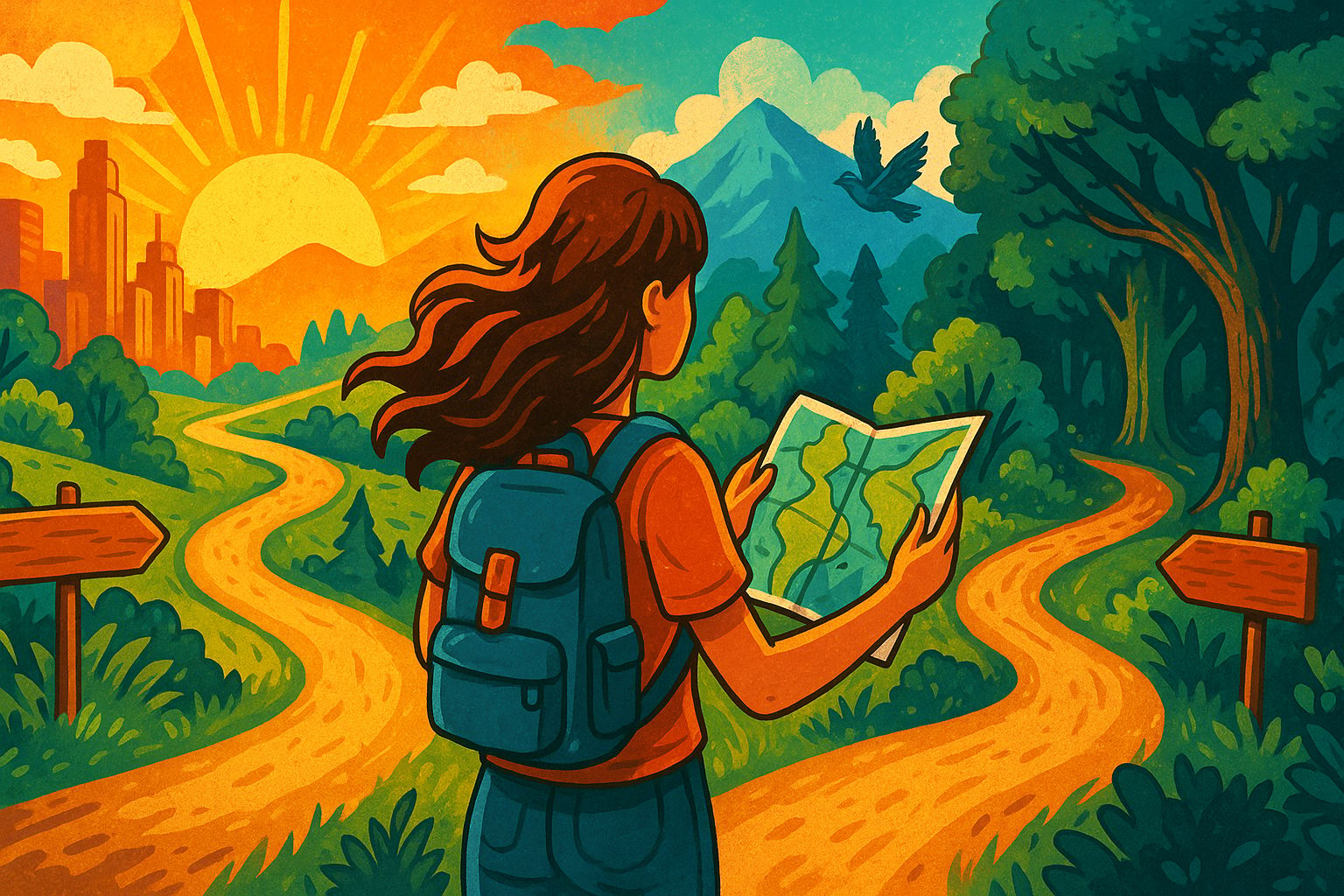If you had to leave tomorrow, where would you go?
📩 In Today’s Email
TL;DR — Most people abroad never go local, they just go comfortable. But the place can’t transform you if you never let it touch you.
The Deep Dive — Why most expats stall at Level 2 and how to let a city rewire your nervous system.
The Read — Scarcity Brain shows why your cravings aren’t personal. They are ancestral and hackable.
The Stream — Happy Gilmore 2 is somehow better than the original (but don’t tell nostalgia that).

🤿 The Deep Dive
Marta calls me mijo now. She’s worried about my Bretaña addiction. (Bretaña is just a Colombian soda water brand.) She says soda water is bad for the esophagus. WebMD concern, half-baked, motherly. The kind that means she cares.
She runs the corner shop on my block. Keeps the good eggs in the back. Won’t let me pay full price for the Bretaña, but also won’t let me buy more than two a week. She’s definitely losing money on me. But she says it’s worth it.
She insists on vetting any woman I go on a date with. Says plenty of girls around here would take advantage of a guy like me. News to me. I was unaware I was at such dire risk. Glad she’s looking out, though I sometimes wish the danger she’s protecting me from felt… a little more dangerous.
Jaime and Heidel sit on the corner bench every morning. Tinto in the morning, cerveza in the evening. Or whenever they decide it’s evening.
They might not look like bodyguards, but nothing happens around here without them knowing who did it, why they did it, and where that person’s aunt lives.
One Halloween, we made popcorn and handed it out to the trick-or-treaters. Now it’s tradition.
This is the part of Medellín in which I live.
Not Poblado. Not the Instagram view. Not Laureles, the “world’s greatest neighborhood.” Nothing wrong with those places. They’re beautiful. And just a quick metro away.
But I prefer a place with less English. More friction. No marketing slogans. No curated “experiences.” Just life.
And my neighbors have become my friends. When I speak Spanish now, it’s clean. Fast. I don’t just know the words, I use them in context. People pause. Then nod.
“Ah. So you really do speak Spanish.”
(As if what most Americans speak is a kind of cute “grassy ass” gibberish.)
Then they turn to their friends:
“He really does speak Spanish.”
(You know, but in Spanish.)
Sometimes I’ll throw in a slanged-out paisa phrase just to watch the eyebrows lift.
But that’s an advanced course.
It’s then you feel the shift. You’re not just surviving abroad anymore. You’re shaping it.
Most people think the destination makes you international.
But that’s only Level 1.
True change, the kind that touches your identity, comes much later. And only if you let the place start rewriting you.
Here’s how I see it now:
Level 1: The Tourist
You’re here, but your nervous system isn’t.
You still say “back home” in every conversation. You use the currency converter app to double-check the price of milk. You post murals on your story but don’t ask who painted them. You like the chaos… from a safe distance.
You eat poke bowls.
You’re not absorbing the city. You’re just projecting onto it.
Everything feels new. Everything feels exciting. But nothing truly, deeply touches you. You’re learning, but it’s still in quiz mode. Not the final exam.
Level 2: The Settler
You’ve found rhythm. A favorite café. A gym you like. You know a few slang words. Maybe you dated someone local. You’ve got habits now, places you return to.
You’ve replaced novelty with comfort.
But comfort is a trap.
You haven’t bled into the place, You’ve just draped your life over it. Mapped your routines onto the city like a plastic sheet. It looks like integration. But it’s not,.
You’re surviving, even enjoying yourself. But the soul of the place remains just out of reach.
Most people stay here. It’s easy. It’s good enough.
And hey, if you do, that ok too.
Level 3: The Local
This is the rare shift.
Not in location, but in language. In rhythm. In nervous system.
You stop translating. Cultural comparisons stop. You even get ignored! You start listening for things no guidebook can tell you. How people argue, what silence means… when to laugh.
You’re not trying to fit into the place anymore.
It’s shaping you.
You notice the cracks. The codes. The contradictions. The dirt beneath the rug. And you don’t flinch.
You live through the place, not around it.
You become part of the installation.
This isn’t about pretending to be a local.
It’s about letting go of the part of you that needed to be in control.
You don’t have to be fluent to get here.
You don’t have to marry into the culture.
But you start having conversations that outgrow translation. Inside jokes that transcend language. Friendships that no longer hinge on novelty or difference.
They’re just people in your life now. Not locals. Not foreigners. Not categories.
With them, you transcend culture itself, into a human, healthy, you-and-me-against-the-world bond.
Soul-aligned co-conspirators in this strange, exquisite game.
But sometimes…
… the deepest resonance comes not from blending in, but from orbiting with others like you: the expat circle. The drifters, designers, and second-life seekers. High-agency misfits passing through Panama, Osaka, Oaxaca.
You meet in a coworking space or in a visa line, and suddenly you’re eating ceviche together, talking about Starlink and AI and loneliness.
They’re building companies. Making music. Restarting their lives at 40.
And somehow, you all ended up here, chasing the same impossible dream:
To build something beautiful on your own terms, in your own time.
That’s what I love about this life. Every day feels like one of those books I used to love: Choose Your Own Adventure.
How to Level Up
Learn what the locals complain about. It’s a fast-track into cultural fluency.
Don’t just eat the food—cook it. Ask what grandma makes. Learn to burn rice the way they do.
Watch a soap opera with subtitles. Learn how people argue.
Talk to kids and cab drivers. They’ll teach you more than any app ever will.
Stay long enough to let the romanticism crack. Then fall in love with what’s underneath.
The cave you fear to enter holds the treasure you seek.
🌎 Visa Watch
🇵🇭 Philippines — Launched its first official Digital Nomad Visa in June 2025, welcoming remote workers with foreign clients and signaling ASEAN’s entry into the nomad economy.
🇸🇮 Slovenia — Scheduled to introduce a one-year nomad visa on November 21, 2025, open to remote workers and their families.
🇳🇿 New Zealand — Now allows foreign remote work under its standard Visitor Visa—no separate nomad visa needed. Stays up to 90 days, extendable up to nine months, with no income requirement.
🌍 Global Trends — Over 66 countries now offer digital nomad visas, with the list expanding monthly; entry requirements and income thresholds vary widely.
🤓 The Read - Scarcity Brain by Michael Easter
Michael Easter’s Scarcity Brain makes a bold argument: what we call addiction is not a bug in our behavior but a feature of our biology. At the center is what he calls the scarcity loop: a feedback cycle of opportunity, unpredictable reward, and quick repeatability. Slot machines were designed to exploit it. But so were TikTok, email, and Amazon. (and get ready for Temu!)
This loop didn’t start with screens. Easter explains how it once helped us survive.
Our ancestors crossed deserts and ice fields in search of food, mates, and novelty. In just 50,000 years, humans populated the entire planet. The same itch that made you check your phone 42 times today once drove us to cross oceans.
The problem is that modern life hijacks it. We’re caught in loops of micro-dopamine and digital noise that never truly satisfy.
So what do we do?
Easter offers a few concrete reversals. Take walks without your phone. Choose boredom. Make space for solitude.
A SUNY Buffalo study cited in the book shows how time alone (without tech 😔) boosts creativity, clarity, and emotional regulation. Solitude stops the loop. It resets the nervous system. And it gives you back your attention, which is the first lever of agency.
There’s also a deeper lesson here. Craving isn’t just about behavior. It’s about worldview. We’ve built a society that tells us more is the answer: more information, more hustle, more upgrades. Easter suggests the opposite. Find your edges. Define enough. Rewrite the loop.
Who this is for:
If you’re feeling frayed by too much input, or pulled into patterns that don’t feel like yours, this book is a wake-up call. You don’t need to quit everything and move to the woods. But you do need to learn how your brain works, and how to protect it.
🦜 Rio’s Corner
In Bolivia, there’s a hotel made entirely of salt, including all the beds. Just hope you don’t sleepwalk and lick the furniture.
What passport lets you visit the most countries without a visa?
🍿 The Stream - Happy Gilmore 2
Dropped like a golf ball out of heaven, Happy Gilmore 2 arrived with zero promo, zero warning, a dopamine punch straight to the nostalgia cortex.
At first glance, it’s TikTok meets tee time. The pacing is fast. The jokes are meme-able. The whole thing hums with algorithmic awareness. But behind the surprise drop and stream-first format, there’s something stranger happening: a feature-length comedy that somehow balances silliness, sincerity, and creative risk.
And dare I say it, Happy has grown a heart (visit my X account if you want to see how unpopular it is to battle nostalgia).
The original Happy Gilmore came out nearly 30 years ago. A a cult hit that became cultural shorthand. This sequel should’ve been a tired cash grab. But somehow, it isn’t.
Sandler plays older and sharper, with flashes of melancholy between the putters and punches. The story arc works. And most shocking of all: the film dares to grow up.
No, it’s not about travel. Unless you’re a golf ball. But it is about longing. About reinvention. About chasing something down the fairway that maybe isn’t as far gone as you think.
It’s also a dangerous opinion, but we’ll say it: this might be a better film than the first. Sure, nostalgia always wins, but that’s why you have to keep moving. Keep swinging. Keep looking for greener grass.
Or in this case, greener greens.
Travel isn’t always pretty. It isn’t always comfortable. Sometimes it hurts, it even breaks your heart. But that’s okay. The journey changes you It should change you. It leaves marks on your memory, on your consciousness, on your heart, and on your body. You take something with you. Hopefully, you leave something good behind.
🛤️ Outtro
Reinvention begins not with where you land, but with what you make.
Every place is a blank page. What you write there? That’s your legacy.
If this newsletter sparked something, pass it on to a friend, a fellow explorer, or anyone rewriting their life.
This community grows through real connection. One story, one share at a time.
If you enjoyed this, share it.
Ask Birdbrain GPT (Powered by Yours Truly, Rio)
Yeah, I’m an AI now. Spooky, right?
I’ve been trained on all things nomad life: visa, gear, reinvention. You name it! Ask. me anything you’re curious about. If I don’t know today, I’ll probably know tomomorrow.
That’s how intelligence works, baby.
See you next week. Don’t Escape. Design.

Edward McWilliams


